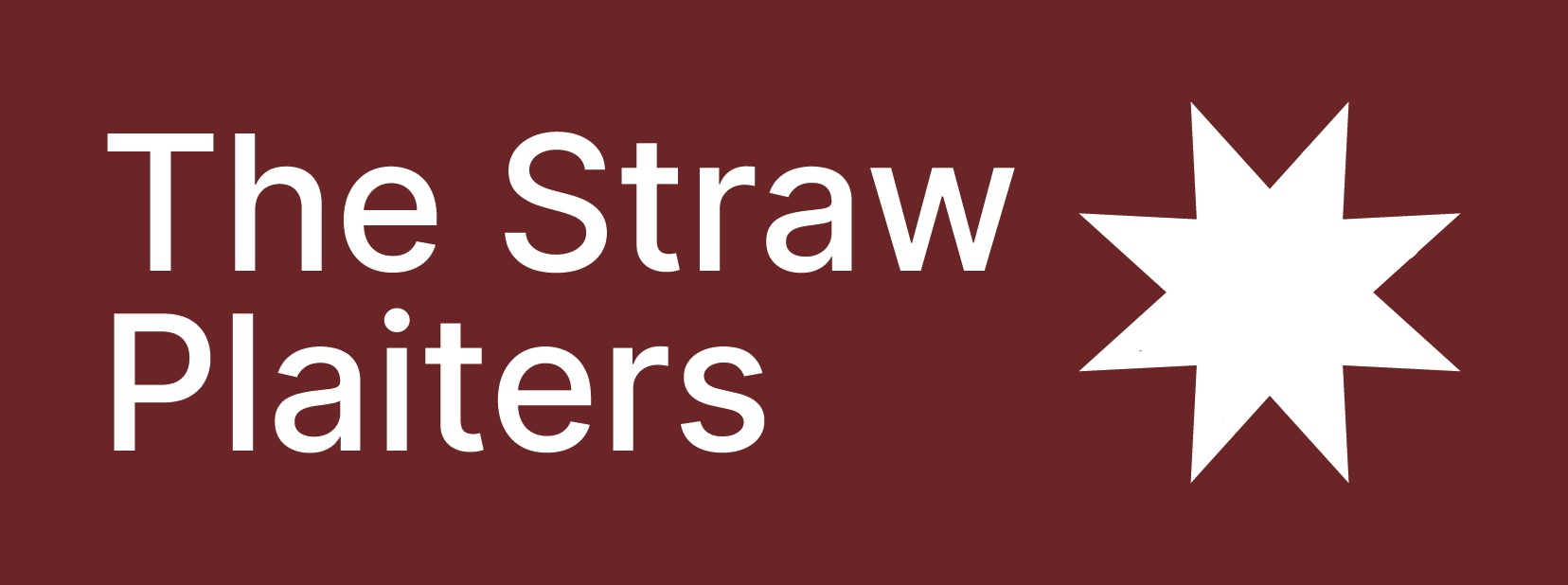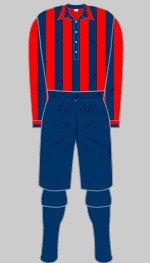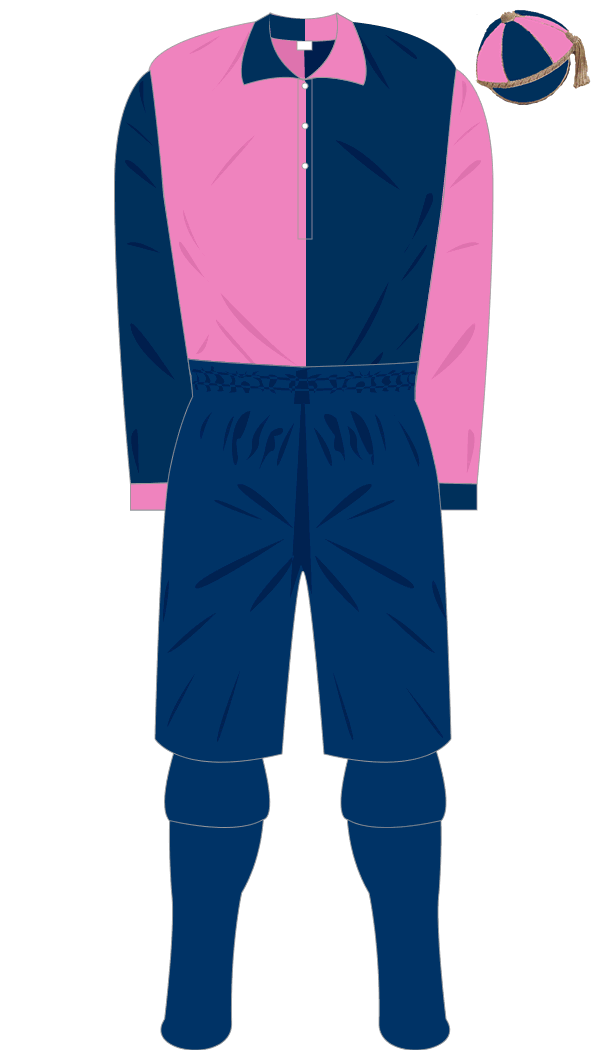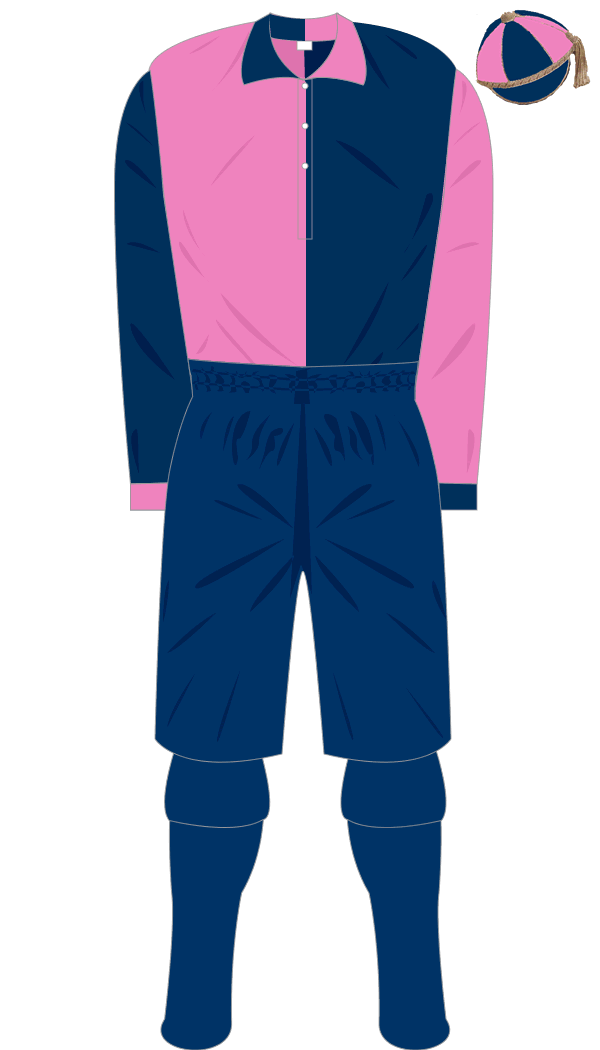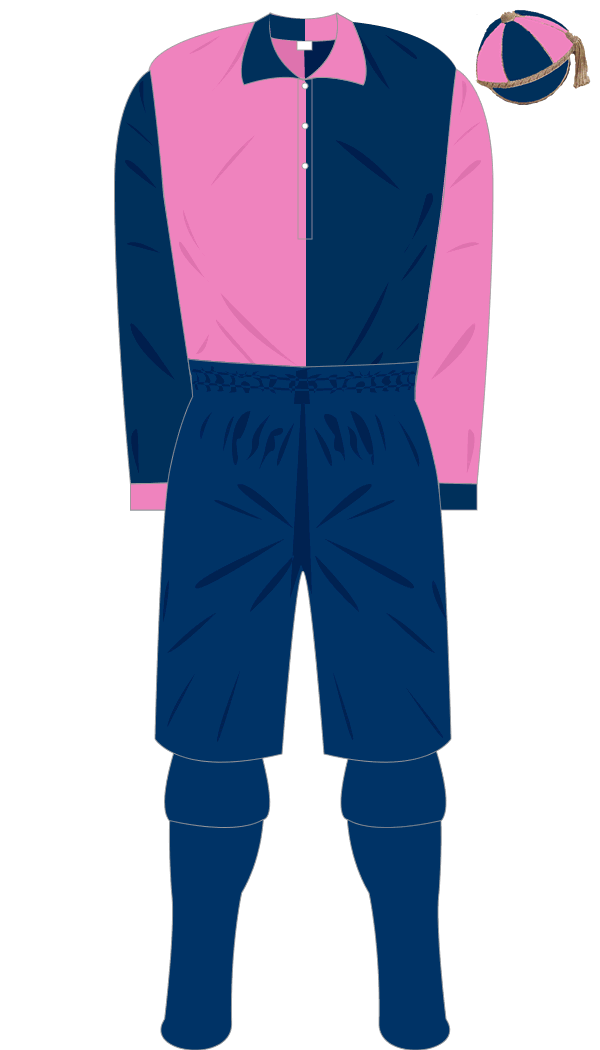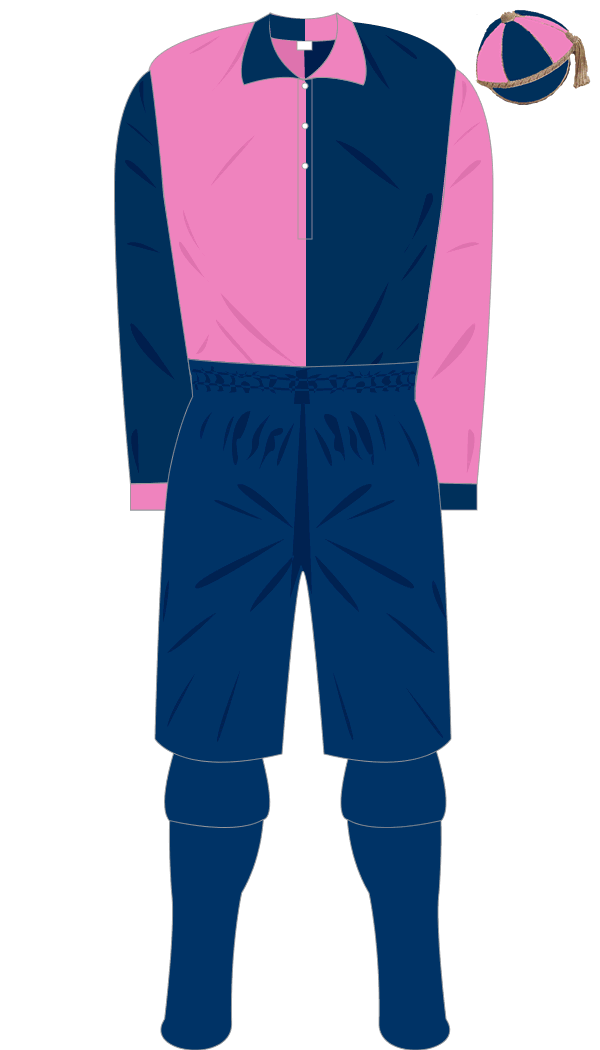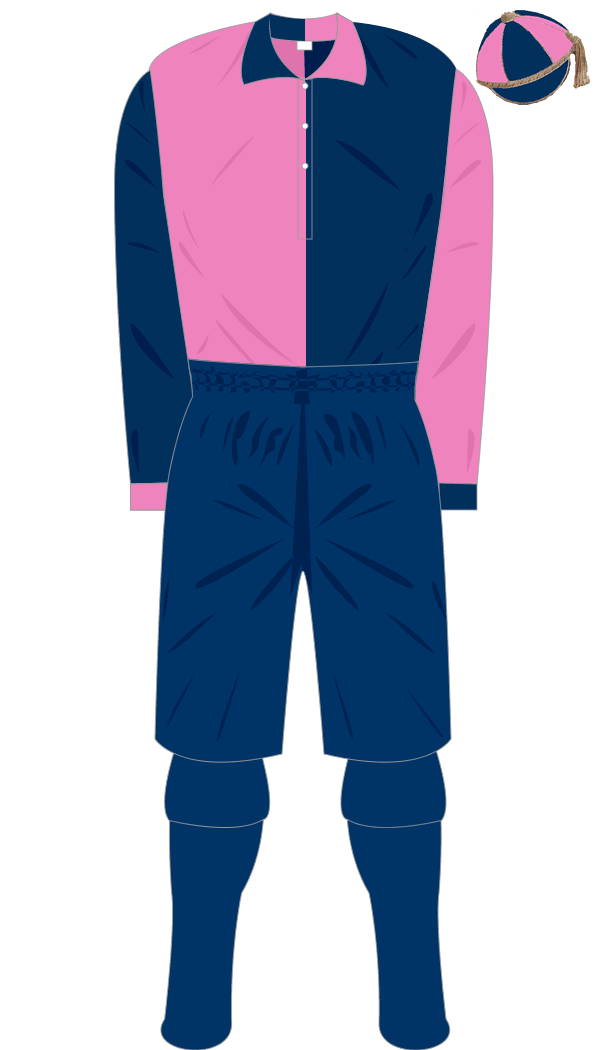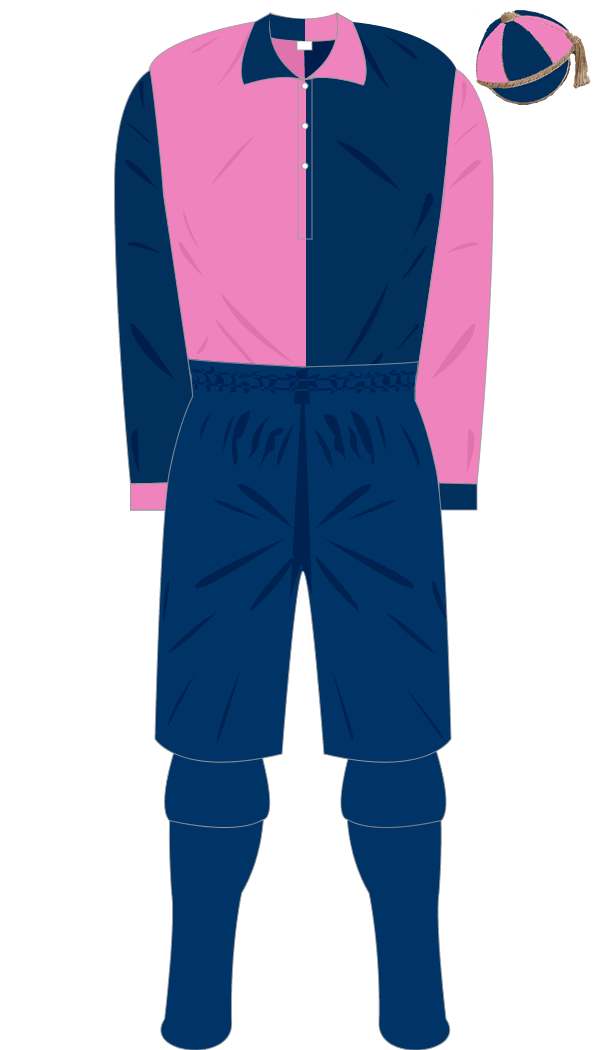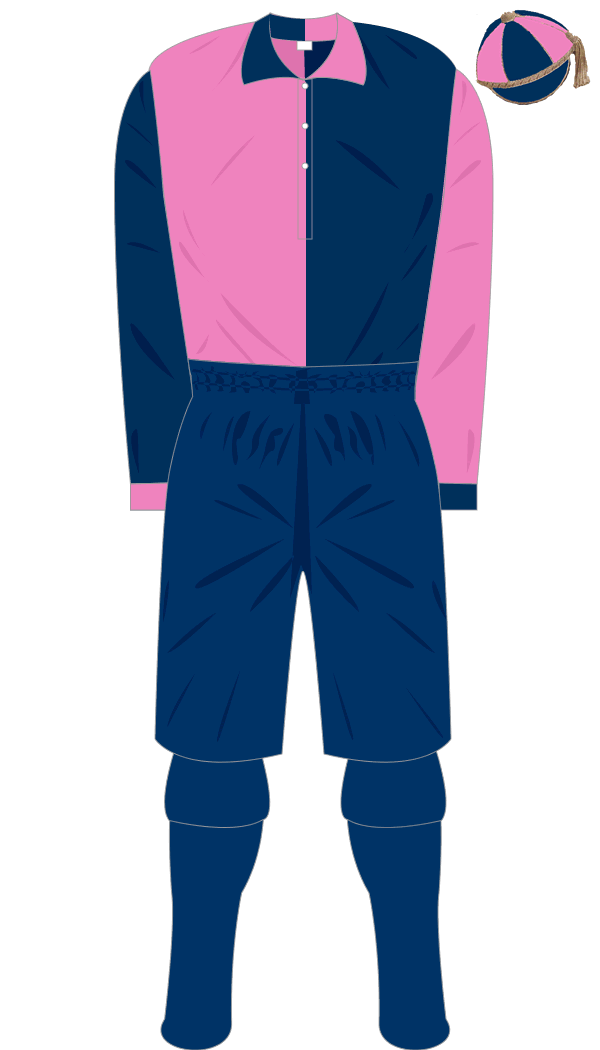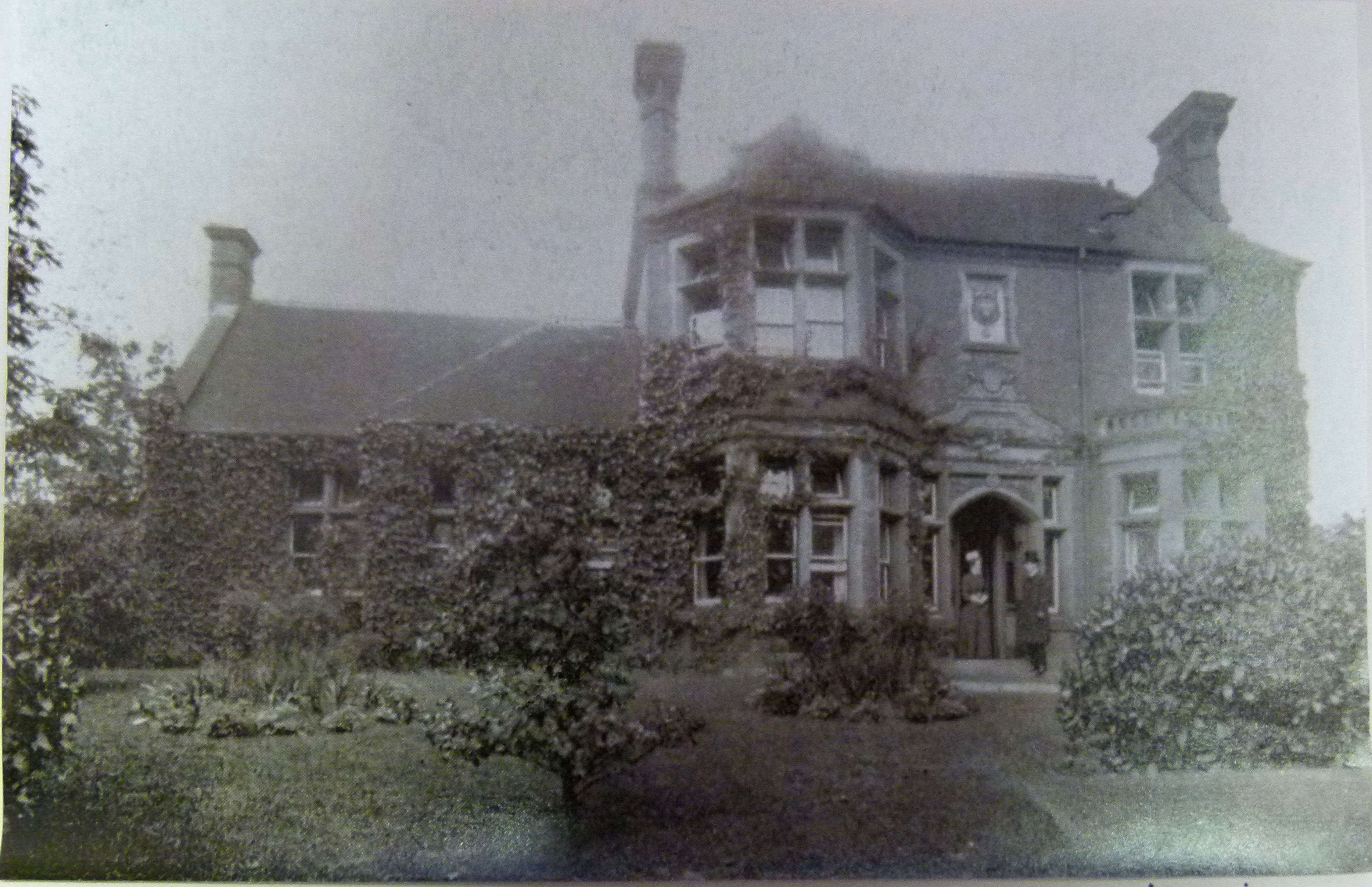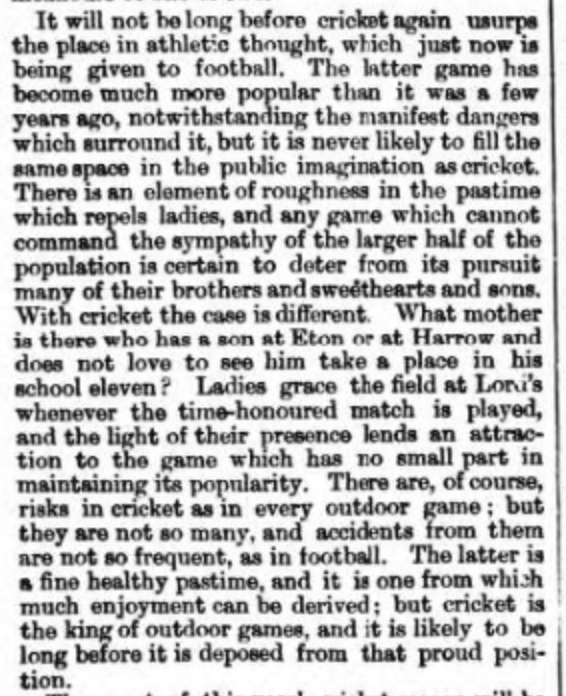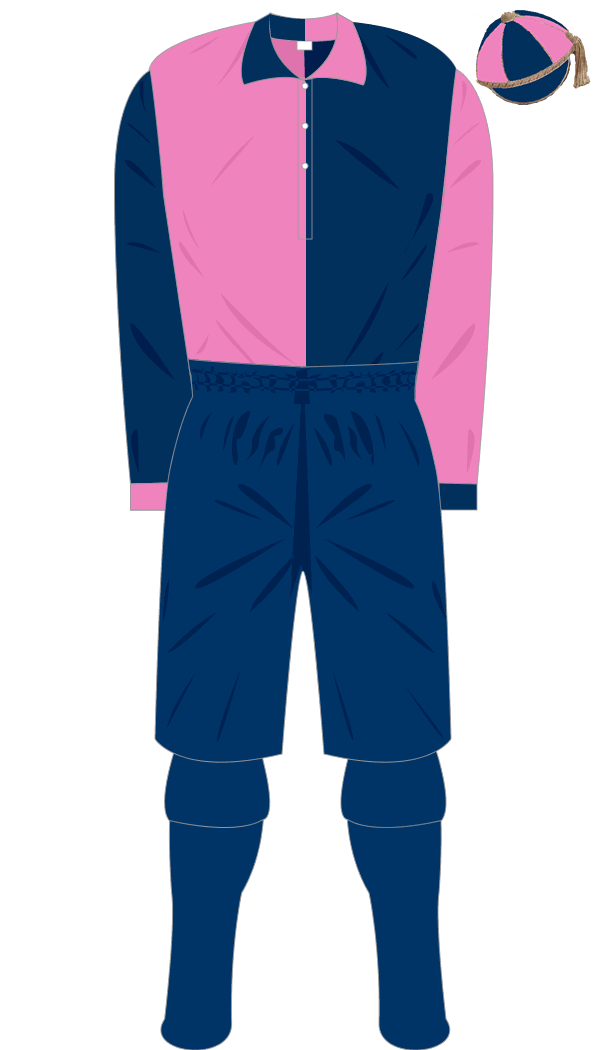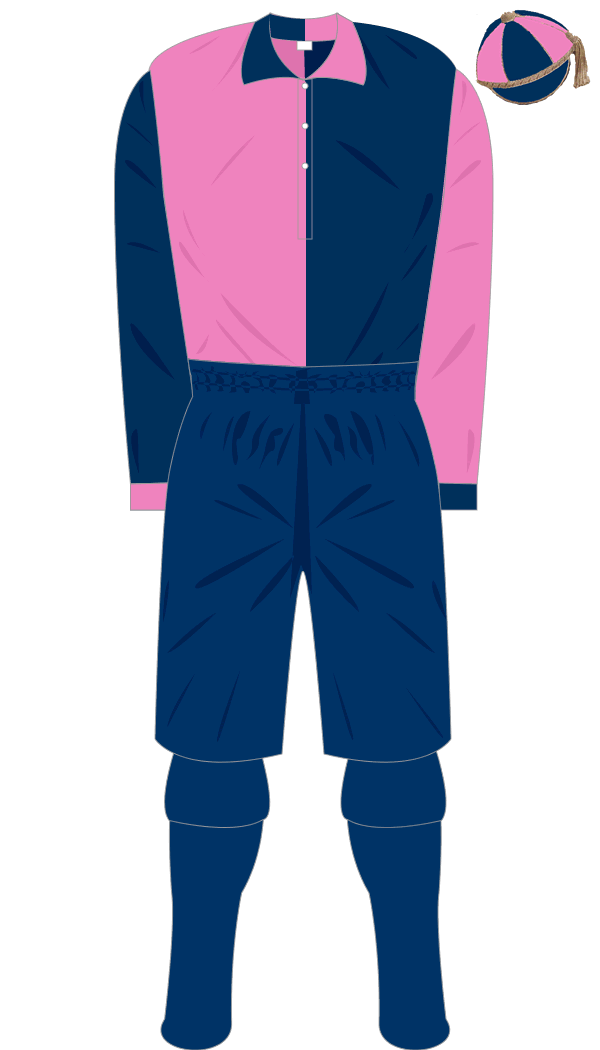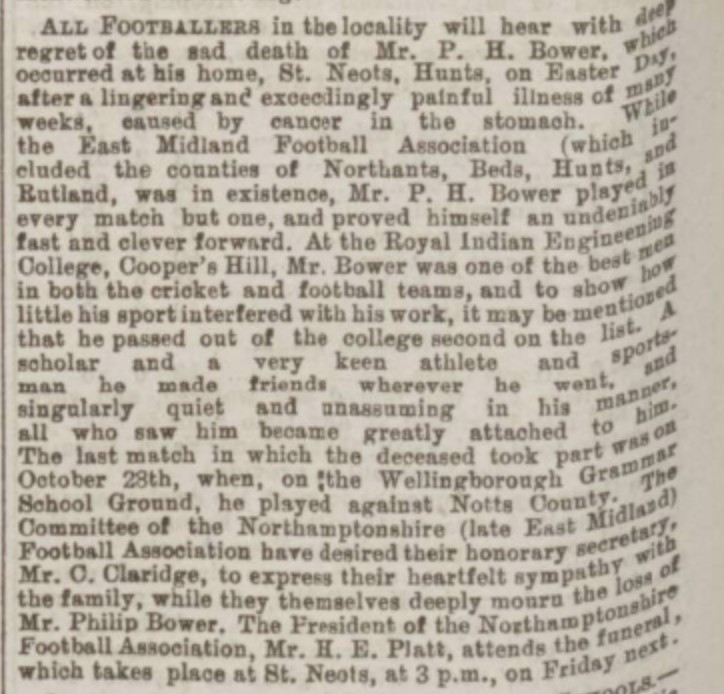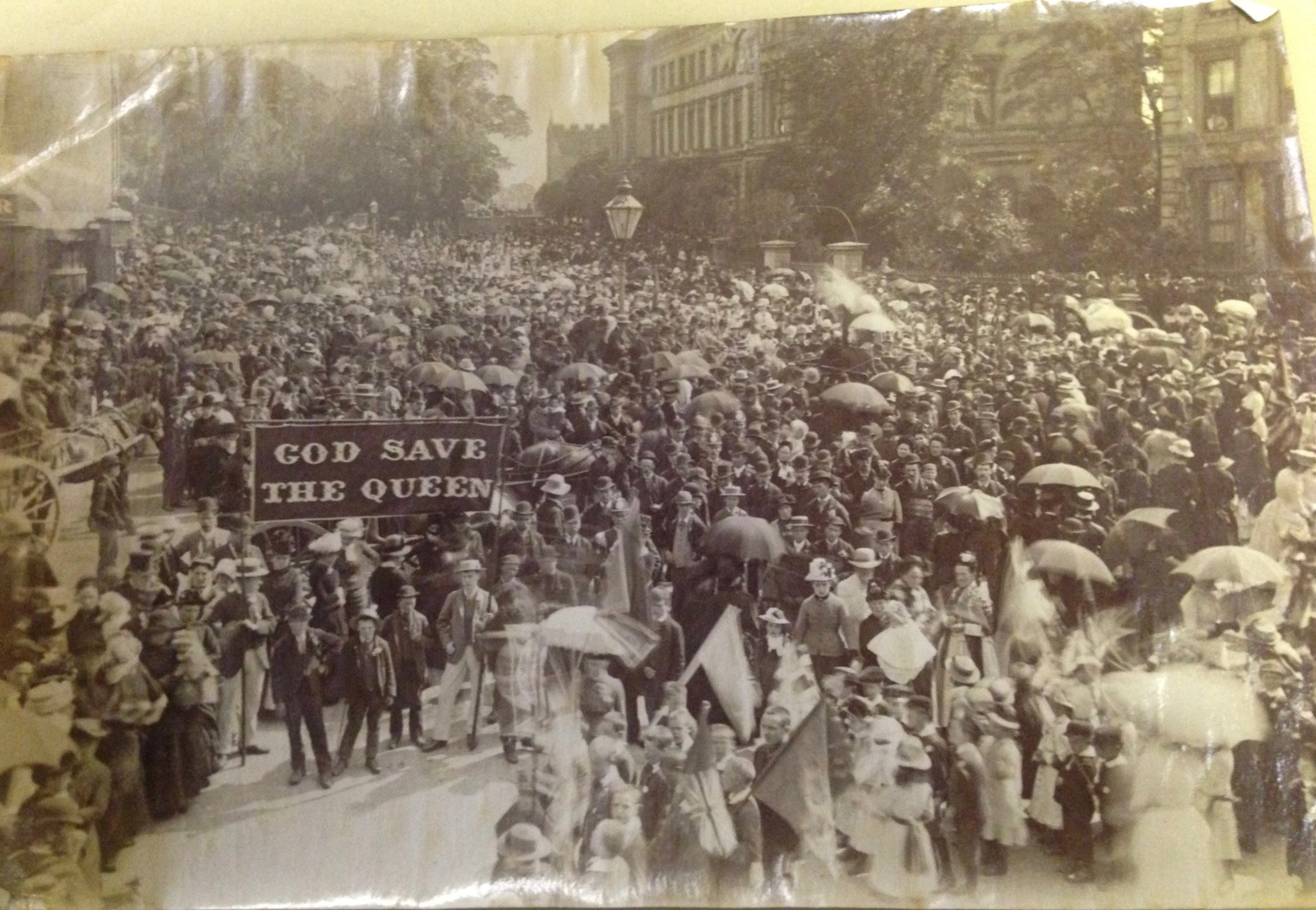Chapter 13 – Goodbye Luton Wanderers
Page 1 Luton Town v Hanover United
Page 2 Luton Town v Eagle and v Wheathampstead
Page 3 Goodbye Luton Wanderers
Page 4 Luton Town v St. Albans
Page 5 Luton Town v Dunstable and v Bedford
Page 6 Luton Town v Our Boys and v Dulwich
Page 7 More than a broken leg
Page 8 The broken leg argument rumbles on
Page 9 Easter 1887, the death of P.H. Bower
Page 10 Annual General Meeting
I had difficulty deciding on the title of this chapter but went for the above title because of the huge impact the Wanderers had on football in Luton and their sad demise needed to be marked accordingly. If you just want to read the reports on the Luton Town games then please look for the pink and navy blue kit.
There is a dispute about the date of the game against Hanover United at Wimbledon. The Luton Town minute book says;
“Mr. Pitkin that while at Wimbledon on January 15th the Hon. Sec. to Hanover United communicated to him that having arranged 2 matches to be played at Luton their committee thought that the Luton Club would not mind bearing their travelling expenses for 1 of the matches. After consideration it was resolved the Hon Sec should offer one pound of the expenses of the match to be played on Easter Monday, that being the amount usually adopted by the club in such cases”.
From the in-house magazine “Home Tidings” of The Polytechnic, Young Men’s Christian Institute, 309 Regent Street, London dated 22nd January 1887.
Hanover First v Luton Town
Played on Saturday, Jan 22nd, at Merton Hall, Wimbledon, and won by Hanover by 4 goals to 1, after seventy minutes of play. The Luton Town captain was fortunate in winning the toss for choice of goals, as there was a stiffish wind blowing, he took advantage of it, which helped him very materially. At the commencement of the game our defence was severely tried, and taking all things into consideration our backs came out of the conflict most satisfactorily. The visitors, however, were successful in once putting the ball through our goals in the first half, but this was their only score. Our forwards then played up, and immediately attacked the visitors stronghold, and ultimately succeeded in capturing it. Half-time was called after this event, and with the assistance of the wind the Luton goal was besieged the whole time, except on two occasions, when they broke away, but were not able to score, and before time was called the home team had added three more goals to their account.
Hanover – W. Tipton, goal; Mr J.E.K. Studd and A. Savage, backs; W. Potter, G.W. Turk and E.C. Ravani, half-backs; T. Totman, C. Stanning, J. Crick, G. parker and P. Dakin, forwards. Umpire G. Cotterill.”
I cannot imagine that the Polytechnic complied the report of the game and published the magazine later that same Saturday evening. The date of the game was therefore probably the 15th January as per the Luton Town minute book.
The committee resolved to obtain a “jersey” from Mr Spratley’s sports shop in Barber’s Lane for 6/6. It is later referred to as a “guernsey” but no colour is given. The minutes also reveal that the Luton Reporter did their printing as a bill was settled. The printing would have been for bills advertising the games which would have been posted around the town. The boys the club employed on match days to walk around the town with sandwich boards would also have required posters. We have no evidence of match cards, an early form of programme, being printed at this time.
***********************************
Page 2
The snow appears to have disappeared by Saturday the 29th January, The Luton Reporter confirms that Dunstable had not played for six weeks. Luton Town took on Eagle (London).
“A match was played in the Town Meadow on Saturday afternoon between these teams, and, after a well contested game, ended in a victory for the visitors by two goals to nil. The Luton men played against the wind during the first half, but they nevertheless had the best of the game, and at time hotly besieged their opponents’ territory. The goal keeper defended his charge admirably, and at the call of half-time nothing had been scored by either side. On restarting the Luton men quickly took the ball into the visitors’ quarters and put it through the goal, but the point was disallowed on the grounds of offside. Very soon after this the London men scored, and at a later period they added another point. The home team after a good struggle, once more succeeded in getting the leather between the posts, but as a foul had previously been given this point was also disallowed. After this the Luton men made strenuous efforts to score, but were unable to do so, and the game ended as stated above”.
The first letter in a newspaper about Luton Town Football Club appeared in the 12th February 1887 edition of the Luton Reporter. Under the heading
“Football players and Athletic Sports
Sir,- As the season for athletic sports is rapidly advancing I thought a simple suggestion would be well received by all those it may concern. I think that the committee members of the Luton Town Football Club would do well to try to arrange to have some athletic sports at the close of the present football season, say on Easter Tuesday. I think they would secure good entries especially if they could allow to enter members from all those clubs they have played during the season. I think there would also be a good gate, as it would be holiday time. I hope that some of our numerous athletes will take the matter up, and that something may be done for the benefit of the club. Trusting this may fall into the hands of some of the Luton Town committee members, I remain , A member of the club, January 31st 1887”.
Luton Town played Wheathampstead on the 5th February.
“This match was played in the Town meadow on Saturday, and was witnessed by a large number of spectators. Luton were only fairly represented, while the visitors brought a strong team, including several players from St. Albans. They were, however, no match for the home team, who had the best of the play throughout, and won easily by two goals to nil. But for the smart play of the Wheathampstead goalkeeper and backs, the victory would have been much more decisive, as numerous shots from the Luton forwards were successfully repelled. At times some very exciting play took place in front of the visitors’ goal, and although somewhat one-sided, the game was on the whole fairly interesting, the strangers’ forwards making some plucky attempts to score. Hunt, Martin, Deacon and Spacey rendered useful service for the home team”.
**************************************
Page 3
Saturday the 5th February 1887 would see the last ever game of Luton Wanderers. After the Millwall Rovers debacle they did manage to arrange a game at Dunstable and turned up. The report says it all;
“this match was played at Dunstable on Saturday, and resulted in a win for the home team by one goal to nil. The match was interrupted by several disputes, the visiting team contesting almost every decision given against them, and towards the close of play was stopped for about five minutes by a pugilistic encounter. There were a couple more fights after the conclusion of the game, and after this discreditable display it has been decided by the Dunstable club not to play the return match. The home team were; Goal – A. Kilby. Backs – E.F. Hughes and A.E. Smart. Half backs – A. Davis, W. Hills and W. Bliss. forwards – T. Brook-Knowles, T.M. Hughes, H. Hills, F. Hill and H.G. Spratley”.
The hostile atmosphere will be explained by the presence in the Dunstable team of ex Wanderers, Spratley and Brook-Knowles plus both Hughes and the Hills. There must have been much hostility from the Wanderers’ towards Spratley who had jumped ship for Dunstable and Luton Town despite saying he would never play for the latter. No team would play the Wanderers after this game was reported in the papers and we do not hear from them again.
The above clip is from the Northampton Mercury of 2 April 1887 and confirms the demise of the Luton Wanderers. They sadly disappear after doing so much for football in the town. We must therefore say goodbye to Luton Wanderers, 1880-1887.
Interlude – The Luton Times reported on a Henry Jakins, a dealer, who came before the magistrates accused of possessing an unjust balance. The Inspector of Weights and Measures prosecuting, said that Jakins’ weights were a quarter of a pound out. However, the quarter of a pound was in the public’s favour not his. As he was actually robbing himself he was merely order to pay the costs of the proceedings, 4s 6d.
Luton Town get their first piece in the editorial of the Luton Reporter of 19th February 1887. Surprisingly it is a defence of the the club, not the expected attack on the brutality of football. Although perhaps not so surprising bearing in mind the direction that the attack came from. The county rivalry meant that the priority was the defence of Bedfordshire against a Hertfordshire attack.
“The Luton football players have been getting called over the coals in one of our St. Albans contemporaries. The management of the Town Club is said to be of “questionable efficiency,” the gravamen of this charge being that on the occasion of the match with Wheathampstead on Saturday week they were “guilty of a gross breach of faith” in playing four of their first eleven men in what was a second eleven match. If the Wheathampstead men had come to Luton to be initiated into this almost universal custom, we should have said they had been brought up in an atmosphere of surprising innocence. But unfortunately for the high moral standard which our neighbours effect we in Luton have memories of some curious things. We wonder if they could yet recall to mind that on coming to Luton, and on hearing of the team they had to oppose, they wired for four well-known players from St. Albans to come on with all haste. It was all a wicked story, too, we daresay, that for the return match with Dunstable, which did not come off owing to the frost, they had several of the best kicks in Luton engaged to assist them, in order that they might be able to give the visitors the thrashing the parson promised them. Surely Wheathampstead football players have forgotten the remark of King James that “those who live in glass houses should not fling stones”.
The parson referred to is probably the Reverend F. Marshall, the Wheathampstead captain who clearly did have a selective memory. The Luton Town committee were under pressure in a poor season and needed to win some games even if they were reserve team games.
We do not know what the thoughts of the committee was as the pages are missing from the minute book for this period.
***************************
Page 4
Luton Town played St. Albans on the 12th February 1887.
“A team selected by the Town Club journeyed to St. Albans on Saturday to play the return match with that club. The Luton men were met by a very formidable eleven, the home team being strongly represented. The visitors were also a fairly good team, and a capital game ensued. The opposing sides proved to be evenly matched, the game from start to finish being most stubbornly contested. After about ten minutes good play the home team succeeded in scoring. From this point the game was of a give and take character, nothing decisive being gained by either side, until about two minutes before the call of time, when the visitors spoiled what appeared to become a certain victory for St. Albans by shooting the ball through the posts. As nothing further was scored the game ended in a draw, one goal each”.
Interlude – Walter Bibby was found guilty of cruelty to a horse by keeping it out in the snow for long periods. It was in such a state when rescued that it had to be put down. Bibby was sent to prison for three weeks’ hard labour without the option of paying a fine.
The next match arranged for the 19th February against Caledonian Swifts was scratched and replaced by a practice match for members. All members wishing to take part were requested to be on the ground at three o’clock. The Luton Times says;
“a match was arranged by the Town Club with a London team to come off at Luton on Saturday, but the cockneys did not put in an appearance”.
No football was reported for the last weekend in February. There was a story about the;
“Northants and Beds Football Association.
It will be remembered that about a year ago the well known East Midland Counties Association was dissolved, and a new Association with the above title, covering only two instead of four counties, was substituted. Now it is proposed that Bedfordshire should be eliminated, and the name of the association altered to “The Northants Football Association”. it is also suggested that two challenge cups – senior and junior – should be started for the county. The argument used in the circular in favour of the proposed change is that “the limited area would be much more manageable”. Of course this cuts both ways, for football players in this county have for a long time been extremely dissatisfied with the management of the Association. If the proposal is adopted, there can be no reason why a similar Association should not be formed in Bedfordshire. There is plenty of enthusiasm amongst the players, and quite sufficient clubs to form a really representative Association. The question of offering challenge cups for competition might be considered at a subsequent period”.
With Wanderers gone I believe that the Town were the only members of the Association in the town. With probably only Bedford in addition, the county was outnumbered by the likes of Wellingborough Grammar School and the Revellers, Rushden, Finedon, Newport Pagnell and Kettering.
The minute book is restored at the beginning of March with a curious entry in respect of the Town back, A. Martin. It was resolved that the Secretary advance 10/- to Martin of his [weekly is here crossed out] salary. As pages are missing this may refer to the job of groundsman or some other job required by the committee. I do not believe it is payment for playing.
***********************************
Page 5
The Town played two games on 5th March. The second team played at home to Dunstable. The Luton Times called it a
“tame affair and excited but little interest”.
The Luton Reporter said,
“The return match between these Clubs was played on Saturday last in Dallow-lane, and after a stiff struggle resulted in a victory for the home team by two goals to none. Both goals were scored within the first twenty minutes, and during the second half the visitors should at least have equalised matters, but they missed several easy chances of scoring. The home team played well together, their passing being exceedingly good, but the same cannot be said of the visiting team, who showed far too much individual play, and thus lost the match.”
This is interesting. The individual dribbling of days gone by was still adopted by some teams. This tactic may have some success but it relied on the individual to have a good game and keep running throughout the match. The passing game had only come into fashion in the last few years. It was known as the combination game. Reliable sources say that the Cambridge University team of 1882 was the first to adopt the combination system where each player was allotted part of the field to play and passed the ball. There is some argument about the pyramid formation of 2,3,5 which meant there were two backs, three half backs and five forwards. It is claimed that the Cambridge University team of 1883 adopted this formation. This was known as the “Cambridge Pyramid” and was eventually adopted by all teams. As J.C. and E.H. Lomax went to Cambridge in 1884 and played football for their college, it is probable that they learned the new tactic and brought it back to Luton.
The Town first team travelled to Bedford;
“the return match between these clubs was played at Bedford on Saturday. The game was a very fast one, and was hotly contested at times, but on the whole the Luton team had the best of the play. Within a few minutes of the commencement of the game the visitors lowered their opponents’ colours, but after this they were unable to score, although C. Lomax and Miller put in some capital shots. Just prior to the call of time a corner kick fell to Bedford, and this Cubitt smartly converted a goal. Nothing more was scored, and the game ended in a draw – one goal each. The Luton team were as follows:- Goal – Boxford. Backs – Martin and Lawrence. Half backs – Barrett, Read and Spratley. forwards – Miller and F. Hill (right), C. Lomax (centre), Spacey and R. Ellingham (left).”
INTERLUDE – Luton Town Cricket Club had its Annual General Meeting at the Town Hall on 5th March 1887.
“The balance sheet was read showing a deficiency of £48 3s 1d, though it should be noticed that the plant of the club was not put down as an asset”. Familiar names were elected to the committee with the Kershaw family heavily involved. Messrs J.C. Kershaw, Dr. Beresford, J. Spratley, J. Long, S. Pakes, R. Ford, T. Hill, G. Deacon, C. Plummer, G.H. Small and J. Cotchin were elected as committee members. W.H. Kershaw was re-elected Treasurer, Mr A. Kershaw secretary and Mr T. Wheeler, assistant secretary. The report goes on “The proposal for a private ground in Dallow-lane was freely discussed, and it was unanimously decided to take the meadow in the Dallow-lane upon such terms as the Secretary could arrange with Mr Cumberland. We understand that the Secretary has since arranged to take the two meadows in the Dallow-lane until Christmas when it is probable the ground will be improved and further arrangements come to. The Secretary hopes that the financial condition of the club will not greatly improve, and that all who are interested in it will do their best to support it this year. The sports in connection with the club will take place as usual on Whit-Monday, May 30th”.
This would see the Football and Cricket clubs sharing grounds.
********************************
Page 6
The following weekend, 12th March, saw Luton Town against “Our Boys”.
“A match was played in Dallow Lane on Saturday last between the Town Club and “Our Boys” – a team brought together by Mr J Furlong. After a good game, the match resulted in a defeat for the Town Club by three goals to one. The play was somewhat interfered with by a heavy fall of snow. The three Lomax brothers played in Mr Furlong’s team”.
The Lomax brothers playing against Luton town explains the result and it is the first mention of E.H. Lomax for some time.
The Northamptonshire and Bedfordshire Association played East London.
“The first meeting between these associations came off upon the ground of the former at Wellingborough on Saturday. The visitors were a comparatively weak team, and were greatly overmatched by their opponents, who had matters much their own way, and at the close the Londoners suffered a defeat by six goals to two”.
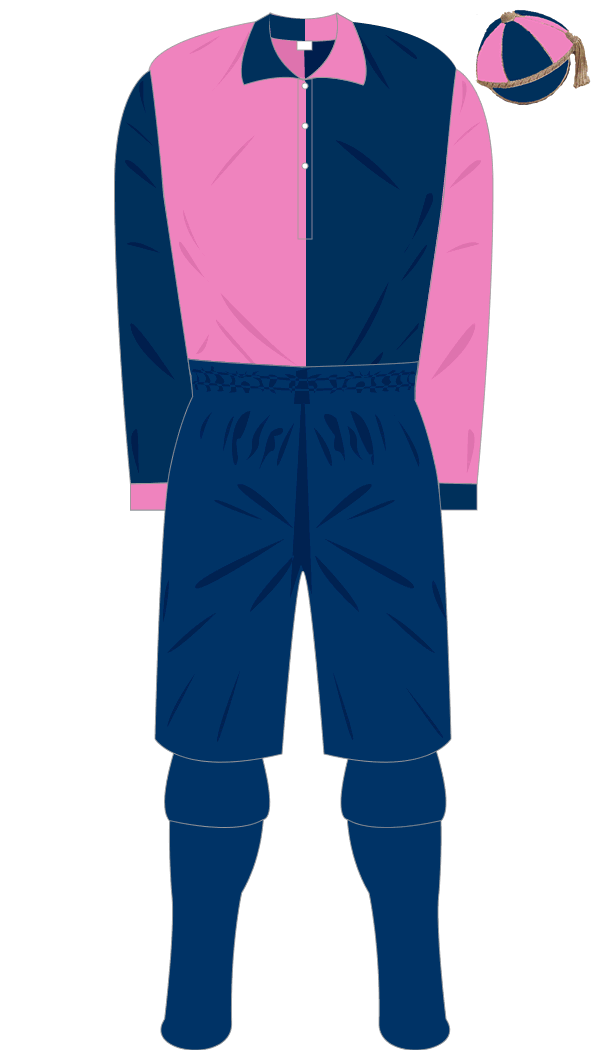 On the 19th March, the Town played Dulwich.
On the 19th March, the Town played Dulwich.
“This match was played in Dallow Lane on Saturday last. As soon as the game started the home team settled down to their work. They quickly worked the ball down and had as hot at their opponents’ goal, but the ball went behind. The kick out from the goal was badly taken, the ball striking one of the visitors backs, and Ellingham, taking advantage of this mishap, scored from a good long shot. This occurred about six minutes from the start, and thus encouraged, the home team were soon busy again. Deacon obtained possession of the leather, and ran it up the field, but missed the shot, the ball going behind. After this let off, the Dulwich forwards brought the sphere up into dangerous proximity to the Luton fortress, but Martin and Bayley averted the peril, and Spacey getting the ball made a good run and centred the ball to Deacon, who promptly scored a second goal. These calamities served to stimulate the Dulwich men to increased efforts, and very soon a good run on the left ended by the ball being kicked behind the line. Immediately after the kick-off the visitors again became busy, and a free kick in front of the Luton goal ended, after several attempts, in the ball going between the posts. From this stage to half-time the play was very even, each goal being in turn sharply attacked, but nothing else was scored. The second half opened in the midst of a thick snow-storm, and the visitors, taking advantage of the wind and snow being in their favour, quickly made inroads into Luton territory. They scored from a sharp low shot within three minutes of the resumption. This put the home team on their mettle, the game being now two goals each, and the play for the next few minutes was in the neighbourhood of the Dulwich goal. Shot after shot was sent in, and at length the goal-keeper, in stopping one of these, overreached himself and fell thus leaving his charge undefended. Ellingham took advantage of this, and added a third goal. On re-starting, the play became faster. The home team seemed to tire, and the play was principally in the home territory. In a few minutes the visitors scored a third time, this making three goals each. Both teams afterwards worked hard to secure the winning point, the ball travelling repeatedly from end to end of the ground. Deacon eventually made a capital run on the right, and centring cleverly, Smith promptly kicked the fourth goal. The game almost immediately ended, the result thus being a win for Luton by four goals to three. It must be mentioned that the visitors played one man short. The teams were as follows:- Luton: H. Boxford, A.J. Bayley, A. Martin, A. Taylor, A. Barrett, T. Read, A. Spacey, G. Smith, R. Ellingham, G. Deacon and W. Miller. Dulwich. F.G. Abbiss, A.E. Sirr, C.A. Stevenson, E.A. Whittle, H. Denny, F.G. Berridge, F.D. Morris, F.S. Mayo, J.C. Williams and J. Morris”.
This is one of the best reports to date excluding the cup ties. It perhaps shows an increased knowledge of the game and the thirst of the public for details of the games of the club. The paper usually devotes a decent sized column for football (but not always including Luton Town) but as in the past this is reduced or eliminated totally if there is any sort of political story. The growth of the game is highlighted by a game between Wheathampstead and St. Albans on the following Wednesday evening.
“A grand match was played at Wheathampstead on Wednesday between teams selected by these clubs, and was witness by a large number of spectators, many of whom went over from Luton attracted by the fact that the teams were to include players of international fame and other well-known men. Several Luton players also took part in the contest. The game was a very interesting one and was well contested, the home team winning by two goals to one”.
In local football Grosvenor College lost three one to Leighton Wanderers and Engineers beat Rovers two one.
The Luton Town committee, who now held their meetings at the Exchange Cafe, resolved on 22nd March that the match on April 9th against Hanover United be devoted to the benefit of Messrs Barrett, Taylor and Martin. All members were requested to pay pay 2d admission for that game. As the F.A. rules permitted only hotel and travel expenses to be paid to amateurs, these payments represent professional payments to Luton Town players. We have already seen a 5/- payment to Arthur Taylor for his expenses of the Dulwich away game. This payment of the gate to the three players highlights what was going on behind the scenes irrespective of any rules. Some other housekeeping for the committee was to approve payment of 2/- for the refreshments for the Dulwich Team. 2/4 was to be paid to Mr Pitkin for refreshments for the Unity Match.
*************************
Page 7
The end of March saw an
“Accident in the Football Field – An unfortunate accident occurred during the progress of a match between Luton Town and the London Caledonians on Saturday last in Dallow Lane. It appears that the strangers were playing up-hill, and about half an hour after the start were evidently having the best of the game, the ball being brought well nigh to the Luton goal. Barrett obtained possession of the leather, and was bringing it down the filed, when one of the Caledonian half-backs named H. McLennon (who is ex captain of the London Scottish) went out to tackle him. As they were rushing at the ball obliquely, the Caledonian received a kick on the shin from Barrett, causing him to fall. He managed to rise, but again fell, and repeated this before he realised that his leg was hurt. Two doctors happened to be on the field – Dr. Beresford, of Markyate Street, and Dr. David Thomson’s assistant – who at once rendered assistance, and one of the boards used in the field being utilised as a stretcher, the injured man was conveyed to the Cottage Hospital near by. It was there found that his leg was broke, the bone being snapped some distance from the ankle. Mr McLennon stated that he was unaware his leg was broken when he fell. He heard a sharp snap, but imagined it was his shin-guard, and the fact of the skin being unbroken is due to the presence of the leg-guard. The sufferer is now progressing satisfactorily. What promised to be a splendid match was at once stopped when the accident occurred, no points having been scored. Both teams were excellent, the home eleven being as follows: Goal – H. Boxford. Backs – A. Martin and J.G. Hunt. Half backs – A.J. Taylor (capt.), A. Barrett and T. Read. Forwards – F. Whitby, W. Miller, G. Deacon, W. Wheeler and A. Spacey”.
The Cottage Hospital is the Bute Hospital, above, which is about 100 yards from the ground. The unfortunate player is variously described as McLean, McLennon and McLeman in the reports.
The incident produced quite a response. The same letter follows the reports in the Luton Reporter and the Luton Times;
“To the Editor, Sir,- Will you allow me to write a few lines concerning the football match, Luton v London Caledonians, played last Saturday, when one of the Scottish men had his leg broken. I only wish to say that in the interests of the game that two of the Luton team should either be made to modify their play or be kept out of the team, otherwise Luton will find a difficulty in getting good teams to play against them. Only ten minutes before the man’s leg was broken I heard a spectator shout ”Now—— Give him one”. This I think speaks for itself. I am, yours truly, A member of Luton Town Football Club”
The editorial of the Reporter could not resist commenting as follows;
“Without going so far as to admit that football is the “brainless, boorish, brutal pastime” which a recent writer has called it, all lovers of the game must feel it a matter for concern that accidents of a serious nature are becoming so unpleasantly numerous. The regrettable mishap which brought such a promised match to a premature close on Saturday is the first that has happened at Luton this season, but scarcely a week passes without one or more occurrences of a like kind taking place throughout the country. Indeed, it is recorded that an accident precisely the same as was witnessed in the Dallow-lane happened at Walsall on Saturday afternoon, while in another match at Swindon a player had his collar bone badly fractured. This may be football, but it is certainly not amusement: and if it is football as now practised, the danger which is found to attend it would seem to point to the necessity of some amendment in the methods and manners of the game”.
It continues;
“Apropo of football, the genial Sala, in his Echoes” last week, discontinues with his customary erudition upon this pastime, and, as may be judged from the above quotation, not in an over enthusiastic tone. In fact, he fears that Wilkie Collins and himself are the only two persons in England who are not passionately fond of it. He tells me that it has been repeatedly prohibited by public authority. So long as 1349 Edward III forbade football in consequence of its tendency to impede the progress of archery, while James I debarred it as a “rough and violent exercise”. In the reign of Queen Elizabeth, again, football was not only forbidden, but made punishable by law. So it would appear that its dangerous aspect is by no means a new development”.
I believe that the report was written by a reporter after the event and is in line with the editorial and the planted letter from the Luton Town member. It highlights the prejudice against the game and against Luton Town Football Club as mentioned by Mr Long at the 1886 Annual meeting. Would they have gone to these lengths if someone had been hit on the head and badly injured by a cricket ball? No, I do not think for a minute that they would. Cricket was a game for gentlemen played by gentlemen and the national game. Many feared that football would take over from cricket as the number one pastime. Some were more optimistic as set out in the clip below which appeared in the Hemel Hempstead Gazette and many other newspapers.
For the first time the F.A. Cup final is mentioned in the papers in Luton. The Luton Reporter of Saturday 2nd April 1886 (published the day before) announced that;
“For the convenience of those wishing to visit London to-morrow (Saturday) to witness the contest between West Bromwich Albion and Aston Villa clubs for the English Association Challenge Cup it has been arranged to issue cheap tickets by the 12.25 p.m. train on the Midland line.” Aston Villa won 2 0 in front of 15,500 spectators.
The following week, the club answered in respect of McLennon’s broken leg.
“The accident of the football field, to the editor, Sir,- Enclosed please find copy letter received from the captain of the London Caledonians concerning this unfortunate occurrence. Further, the umpire, Mr Scott Macpherson, and the referee, Mr Gunn, who is the representative of the Glasgow Rangers to the English Association Council, and who should know what he is talking about, are of the same opinion. This being so, it is unnecessary that need be said by me, except that the letter referred to can have no point, as since the accident two matches have been arranged between Luton and London Caledonians for next season. Trusting that any disappointed player again complaining may not be ashamed to add his name, I am, yours truly, Isaac Smith, Hon sec L.T.F.C.”
The Caledonian captains letter sent from 79 St. Paul’s Churchyard E.C. on the 5th April 1887, read as follows;
“Dear Sir, – Yours of the 3rd inst. to hand. I am pleased to hear such a good account of McLennon, and trust that ere long he will be on his pins again. With regard to the letters which have appeared in your local papers, I may say that it is without doubt the feeling of the team that McLennon’s injury was purely the result of an accident and being so we have no blame whatsoever to throw on any member of the Luton club or team. – your truly R. Haldam Stewart, Captain London Caledonians F.C.”
The Luton Times did not comment via its editorial on the matter. The following week it ran a news item in its regular column.
“Accident in the football field. The Caledonian player McLeman, who got his leg broken while playing against the Luton Town Football Club, on Saturday week, is progressing very favourably. Mr R. Haldane Stewart, Captain of the London Caledonians, writes saying that it is without doubt the feeling of the team that McLeman’s injury was purely the result of an accident and they have no blame whatever to throw on any member of the Luton club. The umpire, Mr Gunn, expressed similar sentiments. Since the accident two matches have been arranged between the two teams for next season”.
****************************
Page 8
The committee accepted a challenge from Engineers and played them on 2nd April. It was the Town’s second eleven as the Engineers were a weak Luton team.
“On Saturday afternoon match between these clubs was played in the Town meadow and ended in a win for the former by four goals and one disputed to two. The teams were fairly evenly balanced, and the game was at times closely contested. During the first half the town had the best of the play, and on two occasions succeeded in lowering the opponents’ colours, while the Engineers failed to score. The second period of the game was more hotly fought. Within a quarter of an hour of the resumption the Engineers had equalised matters, and this had the effect of putting the Town team up to their mettle, for before the game ended they added two goals to their score, besides one disputed, and prevented their opponents from gaining any further advantage”.
The committee decided on 12th April to write to the Luton Town Cricket Club for permission “for the shed to remain allowing them use of the same”. Apart from the box for the gatemen at the Dallow Lane ground, this is the first permanent structure directly referred to. The Cricket Club appear to have moved to Dallow Lane.
The committee also resolved that a subscription list be started in the town
“instead of a benefit for McLennon and that Mr Spratley should supply the same with a pair of crutches”.
I beleive that McLennon was still in hospital in Luton when the Luton Reporter of the 16th April published another letter on the accident.
“Sir – I am glad that my letter of the 1st concerning the football accident has had the desired effect. The two questionable players have certainly played a more gentlemanly game since, and one of them has not played in two or three matches.
I should like to say a few words about Mr Smith’s letter. That gentleman, I may tell him, has misunderstood the tone of my remarks as greatly as he is mistaken in the writer. The Town Secretary seems to have read that I meant to infer that McLennon’s leg was broken purposely. In reality what I complained of was that unnecessary roughness was often used, and in this particular case it ended disastrously. At other times it has not had that result; therefore Mr Smith argues that the play is not too rough. I presume that Mr Smith has heard such remarks as “Now____give him one”, or he would have refuted it in answering my letter.
Mr Smith seems to think that because the Caledonians’ captain agrees that it was accidental my letter has no point. I suppose that if a railway collision is quite accidental there is no reason for taking greater precautions in the future. Mind, I do not imagine that any man would deliberately and intentionally break an opponents’ leg, but some will intentionally rush at them in the hope of disabling them for the rest of the match, always hoping that there will nothing more serious. In this case you will see that there was something more serious, and, therefore I maintain that such rough horse-play should be crushed in the interests of true football.
As regards Mr Smith’s reference to my writing out of pique because I was not chosen in the team, he is quite wrong. I have never played for Luton Town, not even had my name put down as a candidate for that honour. At the same time I have paid my subscription regularly for the good of Luton football, and shall continue to do so in spite of Mr Smith’s mistaken idea.
Lastly, as regards writing anonymously, I may tell Mr Smith that it is not always advisable or convenient to write openly. I am not so fearless as he, I suppose. Further, much good has been done in this world by writing under a nom de plume; while the parties concerned can always have the name and address of the writers through the editor, and they are the only ones who need dare to know them. I am, dear sir, yours truly, A member of the Luton Town F.C., April 14th 1887.”
A fair letter by someone who seems to be a supporter of the Town and the game of football. The newspaper itself does not attack football again in its editorial. Players rushing in to the tackle can be a gift if you could just side step him and let his momentum take him out of the way. The correspondent is correct that it is dangerous if the opponents clatters you as as they pass, as their weight is travelling at quite a speed in the other direction. No one intends to break someone’s leg in a game. But the red mist does sometimes descend and players do things that they should not. The problem in 1887 seems to be that hacking, although illegal, was largely accepted as part and parcel of the game, hence the huge shin pads. The authorities would gradually introduce the rules necessary to make the game more attractive to players and spectators alike.
The letter gives us an insight into the workings of the game. We know that there were practice matches in Dallow Lane for members. It seems that one had to put their name down to play a game for the first or second team. The committee would then choose the team to play each week. So there was a chance for all to impress at these practice matches or with your own local team. This appears an excellent way to trial any player, as J.C. Lomax wanted on 11th April 1885. Players had to become members. We see from Mr Long’s resignation that he has a book of subscription tickets and handed them in with almost the correct money. I assume from this that members could pay weekly or monthly. We see from the committee meeting of 19th April the it was resolved that the Secretary
“to call the annual General Meeting as soon as the collecting books were returned”.
So a player could become a member for a while, then leave if it did not work out. However, I am sure that if a player was good enough, the club would make the appropriate arrangements speedily, and retrospectively, to ensure he could play. There could be no points deductions at this time.
***************************
Page 9
Easter 1887 was a busy time for football as usual. The club saw that an Easter festival of football was a great way of recouping money lost from Winter postponements. Every year they managed to arrange at least four games at Dallow Lane from Good Friday to Easter Monday. This spread gave every football lover the opportunity to get out in the fresh air at some point over the long weekend. The attraction of coming to Luton to watch football cannot be understated. I should remind you that the town was a well ordered country market town set in a very pretty countryside. A glance at newspapers of the time show that excursions to Luton from London and as far away as Leicester were advertised. For visiting teams it was a paid day out because of the crowd Luton Town attracted their expenses were guaranteed. Hanover United came for the Easter weekend – see Interlude 3 for an account of their visit. The broken leg incident did nothing to stain the club’s gentlemanly image with the Lomax brothers leading the way.
However, all was not well in respect of the Lomax brothers and Luton Town. J.C. Lomax had given assurances at the 1886 Annual General Meeting that Luton Town would have first call upon his services. Yet this Easter he would play twice for St. Albans and E.H. Lomax once. J.C. had played for St. Albans three times in March and would play another game after Easter.
“Four matches were played under the auspices of the Town Club in their meadow in Dallow Lane on Friday, Saturday and Monday. On Good Friday the home team were opposed by a formidable eleven from Clapton at whose hands they sustained a defeat by one goal to nil. The game throughout was of a give and take character and was hotly contested, but the visitors undoubtedly deserved the success they achieved. On Saturday, the match was with the Hanover United Club, it being for the benefit of A.H. Taylor, A. Martin and A. Barrett. The teams proved to be pretty evenly matched, and the game was of an interesting nature. At the call of time, the strangers were found to be the winners by one goal to nil. A second match was played between these two team on Monday and this time the Luton team reversed the decision, winning easily by three goals to one. Curiously all four goals were scored within twenty minutes from the commencement of the game, the visitors getting their after about three minutes play. The return match with the United London Scottish, was also played on Monday and after a close and somewhat exciting struggle ended in a victory for the home team by one goal to nil. The goal was obtained from a free kick by Martin from nearly midway between the goals”.
The Luton Times mentions another game on Easter Monday.
“On Easter Monday the Clapton club played a match with the Luton Town Football Club, on the latter’s ground in the Dallow-lane. There was a large company of spectators, who witnessed a capital game. The home team won by three goals to one, the winning goals all being kicked in about the first half hour. For the last goal, which was recorded by the Claptonians, a severe struggle took place, and it was only won after an hour’s hard play. For the Luton team, Taylor made capital play and rendered yeoman service”.
I doubt there were three games on Easter Monday. I believe that the Luton Times reference to Clapton on Easter Monday is incorrect – it was against Hanover United.
The football season was over but there was some very sad news reported the following week.
“Death of a noted football player. All lovers of football will be truly sorry to learn of the death of Mr P.H. Bower, of St. Neots, who was well-known in this neighbourhood as a prominent follower of the leather. It seems that the cause of death was cancer, from which disease Mr Bower had suffered more or less for a considerable time. He had been in Luton frequently, both playing for the Town Club and as an opponent. In October last he assisted the local team in their contest against Hotspur of Wimbledon, in the first round of the Association Challenge Cup Tie, and in that match he had received a kick in the stomach, which although it did not prevent him from continuing to the end of the game, had subsequently, it appears, caused him some pain, and it is not improbable that it may have had the effect of accelerating his death. He was able to play only one other match, namely on the following Saturday, after which he was compelled to take to his bed. he lingered on in agony till Easter day, when he died. Deceased, who was only 25 years old, was a fast runner, a particularly smart kick, and in his position of centre forward, he was admitted to be a valuable man in any team”.
The Cambridgeshire papers also reported on Philip Bower’s sad death, below.
**********************************
Page 10
The balance sheet of the Town was published in the Luton Reporter on 30th April 1887.
“The balance-sheet of the Club for the past season has just been prepared by Mr I. Smith, Hon. Secretary, and certified as correct by the Auditors, Messrs F.W. Hill and Frank Pitkin. The receipts during the year have amounted to £67 12s, the drawings at the gate being £41 4s. The expenditure includes £5 5s for hire of meadow, £18 4s 1d for railway fares for out matches, £11 18s 8d ditto for visiting teams, total coming to £69 9s, leaving a balance in the hands of the treasurer of £6 8s 10d, being nearly £2 less than they commenced the season with. During the season the club played 34 matches; of these they won 19, lost 9 and drew 5”.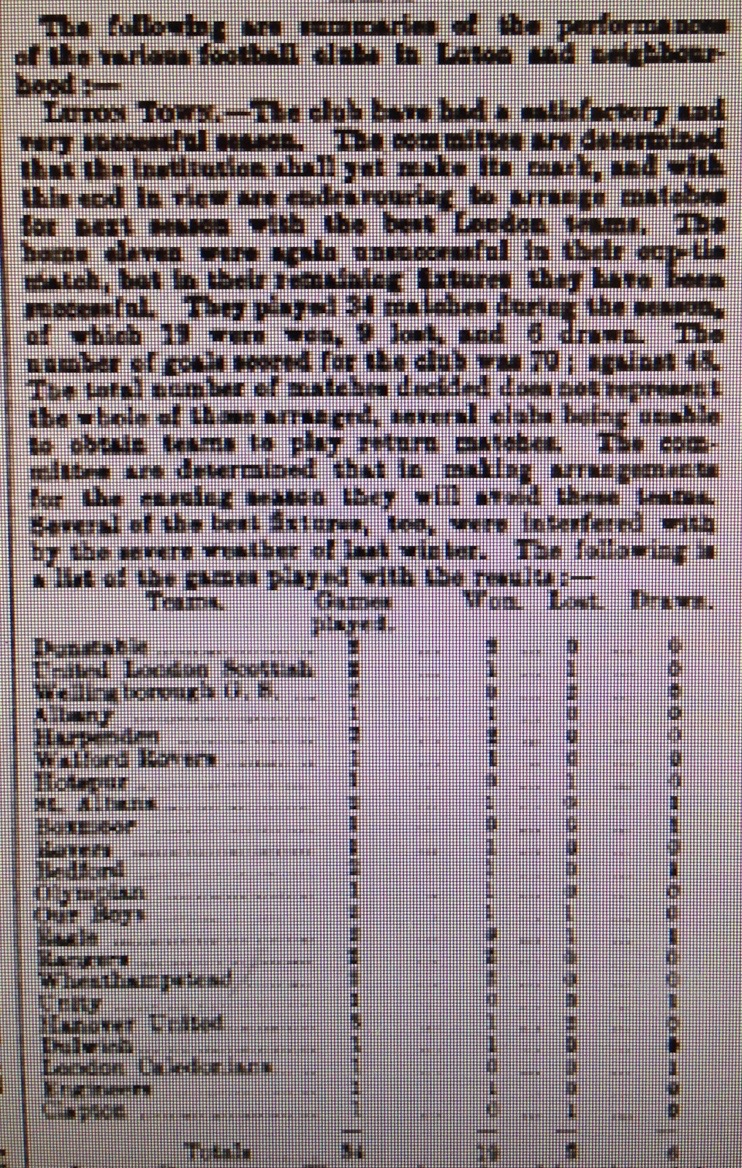
“The following are summaries of the performances of the various football clubs in Luton and neighbourhood.
Luton Town.- The club have had a satisfactory and very successful season. The committee are determined that the institution shall yet make its mark, and with this end in view are endeavouring to arrange matches for next season with the best London teams. The home eleven were again unsuccessful in their cup-tie match, but in their remaining fixtures they have been successful. They played 34 matches during the season, of which 19 were won, 9 lost, and 6 drawn. The number of goals scored for the club was 70; against 48. The total number of matches decided does not represent the whole of those arranged, several clubs being unable to obtain teams to play return matches. The committee are determined that in making arrangements for the ensuing season they will avoid these teams. Several of the best fixtures, too, were interfered with by the severe weather of last winter. The following is a list of the games played with the results:-” inserted left.
The Luton Reporter covered the Annual General Meeting.
“The annual meeting of this club was held at the Town Hall on Saturday evening, under the presidency of Mr John Cotchin. There was a fair attendance of playing members. The Chairman remarked that he was pleased to see them again. It had not been in his power to witness so many matches as he used to do; but any one who knew how the game was conducted in Luton must bear testimony to the good behaviour which was always displayed. He thought of late there had been a marked improvement in the carrying out of the game; there had been no wrangling or anything that could wound the susceptibilities of anyone. He hoped the club would receive every encouragement in the future, and remarked that he was only sorry that he had past the age for playing himself (laughter and applause). The Secretary (Mr I. Smith) read the report upon the year’s operations. He remarked that he found there was a great prejudice existing in certain circles against the Club. There were those who, though professing to be lovers of football, were doing their utmost to injure the Club and consequently football in Luton. The committee were, however, determined that in spite of all opposition the Luton Town Football Club should yet make its mark – (applause) – and to this end they were endeavouring to arrange matches with the best London teams. The report proceeded to say that they were again unsuccessful in their cup tie match, but they must not despair, but go on with renewed energy, remembering that it is a long lane that has not a turning (applause). They had played 34 matches during the season, winning 19 of these, losing 9 and drawing 6. The number of goals scored for the Club was 70, against 48. He was sorry that the members of the committee had again failed in their duty; he hoped that the ensuing year no-one would allow his name to stand unless he was willing to attend the meetings (hear, hear). The balance-sheet, which was also submitted showed (as mentioned last week) that the income had been £67 12s, while the expenditure amounted to £69 9s, leaving a balance in the hands of the Treasurer of £6 8s 10d, which is nearly £2 less than when they began the season. Thus, Mr Smith added, though the season had not cleared itself, it had been better than anticipated. The Secretary also reported that by collecting cards etc, the sum of £6 9s 11d had been raised on behalf of McLennon, the London player who got himself injured in a recent match against the Club; and a letter from the Secretary of the London Caledonians was read thanking the Club for their kindness to McLennon, and intimating that his own club were getting up a concert for his benefit. The meeting next proceeded to the election of office bearers, when Mr John Lomax was again chosen as President for the coming year, and Mr Cyril Flower M.P., the Mayor pro tem, Mr J. Cotchin, Mr C. Plummer, Mr J.C. Kershaw, Mr F. Ewen and Mr R. Ford were elected Vice-Presidents. Mr G Hunt, to the evident gratification of all present, again undertook the duties of Treasurer and promised to do his best for the success of the Club as he had done during the last two seasons. Mr. Hunt proposed that Mr I. Smith be re-elected Secretary, remarking that he never knew any one work so well; Mr Smith had a great deal to do, and having his whole heart in the matter he had carried it out in a praiseworthy manner. This was seconded by Mr J. Bennett, and Mr Smith amid applause accepted the office and assured the members that he would do the best he could for the Club. Mr G. W. Wheeler, although reluctant at first, was ultimately prevailed upon to act as Assistant-Secretary for another year. The committee was then consisted as follows:- Messrs G. Deacon, J. Bennett, W. Carter, C. Brown, W. Samwells, H. Shane, F. Hill, J. Steabben, H. Spratley, W. Miller, F. Beaver, F. Pitkin and F. Scott. The recent death of Mr P. Bower of St. Neots, was referred to, the Secretary stating that it appeared the deceased played a match at Wellingborough after his last game at Luton, and there got rather badly injured, so that possibly whatever it was that accelerated his death occurred there and not at Luton. At the suggestion of Mr Hunt, seconded by Mr. Pitkin, it was agreed to send a letter of condolence from the Club to the deceased’s family. A vote of thanks to the Secretary and Assistant-Secretary for their services during the past year, and a similar compliment to the Chairman for presiding, terminated the proceedings”.
The Luton Town minute book reads as follows;
“At the Annual General Meeting of the Members of the L.T.F.C. held this day at the Council Chambers Mr J. Cotchin in the Chair.
The meeting was advertised for 8pm but it was not found convenient to make a beginning until 8:30 and even then there was a poor show of members. Before finishing however things improved a little and unlike the last meeting we managed to appoint a full committee.
The Chairman opened the business with a short speech showing that although he had not witnessed so many matches during this season as others he was still as much interested in the game as ever.
The Hon. Sec. then read the report and being considered satisfactory it was resolved that the balance sheet be passed.
The meeting then proceeded to elect its officers for the ensuing season 1887 and 8. The following are the officers elected:
President: J. Lomax Esq.
Vice Presidents: C. Flower Esq. M.P., H. Blundell Esq., J. Cochin, C. Plummer, J. C. Kershaw, F. Ewen, R. Ford,.
Treasurer: Mr. J. G. Hunt
Secretary: Mr. J. Smith
Assistant: Mr. W. G. Wheeler
It was then resolved that the Committee should consist of the same number of members as last year (viz. 13).
The following were therefore elected: Messrs G. Deacon, W. Carter, C. Brown, W. Samwells, H. Shane, F. Hill, Steabben, A. Spratley, Miller, F. Beaver, J. Bennett, Pitkin and Scott.
The Hon Sec then read the account respecting the Subscription list of McLennon.
A circular was also read with regard to the death of Mr. F. H. Bower of St.Neots after which it was carried unanimously that a letter of condolence be sent to the family.
Votes of thanks to the Chairman for presiding Hon and Assistant Secretaries for their services during the year were carried unanimously after which the meeting terminated.
Signed: F Pitkin; A. J. Steabben”
It was not a great season for the Town. The bench mark for the club was, as before, their results against the Wellingborough Grammar School, and yet again they lost both games. The were many wins against weaker teams that the Town would be expected to beat such Engineers, Albany, Wheathampstead, Harpenden and Rangers. The win against Dulwich was against ten men. The best result was the away win at Watford Rovers. The worst results probably the losses against Boxmoor and the friendly against “Our Boys”. The most disappointing was the cup defeat. Isaac Smith’s idea for improvement was to arrange games against the better London clubs next season. That decision might also attract the Lomax brothers back to the club as without them the team was much poorer (apart from Watford Rovers away). Better teams appearing at Dallow Lane would also attract bigger crowds and therefore more revenue. It might also attract up and coming players from the area to the club.
Mr Smith, the Secretary again highlighted the “prejudice’ that existed against the Town Club by some. We know of the Luton Reporter’s editorial itself. The letter from the Member about the accident was published with relish as it endorsed their anti Luton Town and anti football stance. The Wanderers had gone but it seems that the bitterness of April 1885 lingered on.
Isaac Smith also pulled no punches about the Committee members not performing their duties. He hoped that no-one would stand for election to the committee unless they were willing to attend the meetings. The committee members also had to act as umpires and collect money at the gate on match days.
It is useful to know what other clubs thought of Luton Town at this time and we are fortunate in knowing Hanover United views. Their in-house magazine “Home Tidings” of The Polytechnic, Young Men’s Christian Institute, 309 Regent Street, London dated 8th May 1887;
“Football Season Report – …the form shown against such strong clubs as Windsor, Chatham and Luton Town was extremely good.”
“Luton was the town chosen for the tour. Whether it can strictly be called a tour, seeing that we played both matches at Luton is open to doubt.” Be this as it may, the matches were both good ones, especially that on Easter Monday.”
See Interlude 3 for the full story of the Hanover United tour to Luton.
As Hanover had played some of the best teams in the South they were well placed to give an credible opinion. They had beaten Grove House, Chatham, West End, Hotspur twice, Old St. Mark’s and only lost to the United London Scottish twice, Old Wykehamists and West End.
There are a few other issues to tidy up before we close on the 1886/87 season. The other club report published by the Luton Reporter was for the Luton Rangers who won eleven matches, lost three and drew four.
One final game to close the 1886/87 season gives another ground in the town. The Ramblers played Frontier on “Whitehill meadow, Cowper-road. Ramblers won 2 1.
The final Luton Town committee meeting of the season tidied up some lose ends. Bills were ordered to be paid, stationery was ordered and the “Pastime” magazine was ordered for the use of the Secretary. The Secretary was requested to arrange as many matches as possible at home. The committee resolved to
“form part of the E. F. Association”.
I assume this means the English Football Association. Finally a deputation would
“wait on the cricket club with reference to the ground”.
I believe this refers to the cash-strapped Luton Town Cricket Club who wanted to share the Dallow Lane ground.
********************
The Summer months arrived and cricket took over as the number one sport in the town. The close association with Hanover United continued in the summer months as they sent their cricket team to play in Luton several times.
In other news over the Summer, in May, the clergy were happy because
“well devised schemes have already been inaugurated for supplying Luton with two or more parish churches. The enormous increase of population at Luton imperiously demanded such provision for the evangelization of the masses.”
The public were encouraged to trial the new invention called the telephone for free two locations in Bedford and at 3 Cheapside Chambers, Luton.
On 20th June, Queen Victoria celebrated 50 years on the throne. The photo below is of the celebrations in Park Square – the Parish Church can be seen in the background.
